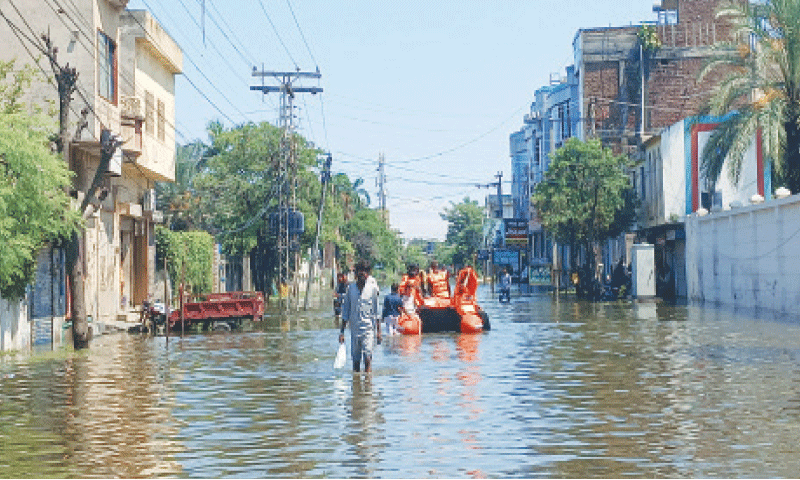Introduction
Urban flooding in Gujrat, Punjab, has left thousands of citizens devastated, not because of nature alone, but because of the district administration’s sheer incompetence and negligence. While governments and bureaucrats enjoy privileges, ordinary families are left to survive amid rising water, hunger, and complete abandonment.
This blog recounts one family’s ordeal during the flood disaster in Gujrat, highlighting the broader governance crisis and why administrative accountability is urgently needed in Punjab.
Trapped by Floodwaters: A Family’s Nightmare
For five days straight, families living along Alipura Road in Gujrat were trapped inside their rented homes, surrounded by floodwater. With five feet of stagnant water filling bedrooms, parents and children endured hunger, fear, and helplessness.
Despite having committed no crime, they found themselves imprisoned within their own homes — a punishment for the district administration’s failure to manage urban flooding.
A Home Turned Into a Prison
Late at night, without warning, floodwater began entering the house. Within minutes, lawns, streets, and entire rooms were submerged. Desperate attempts to block water proved futile. Furniture, appliances, and lifelong possessions drowned before their eyes.
The kitchen and storeroom, filled with essential food supplies, were also destroyed. Electrical circuits short-circuited, forcing the family to switch off the main power supply, leaving them in complete darkness.
Children, starving for nearly 30 hours, cried for food. With no way out, parents could do little but watch their children suffer in silence.
Bureaucratic Incompetence: The Human Cost
The Punjab Government and District Administration Gujrat had claimed that relief operations were underway. Yet, on the ground, no municipal corporation teams, no emergency drainage units, and no disaster relief efforts were visible.
Families were left to fend for themselves. In the absence of state support, the house owner, who lived abroad, allowed the family to shift temporarily to an upper floor. Only then did children get their first proper meal in days.
Children Questioning Humanity
The children’s innocent words cut deeper than any wound. While eating after days of starvation, one child remarked:
“Papa, now we understand Gaza’s children more.”
Such comparisons reveal the psychological trauma of disaster mismanagement. Hunger, thirst, and homelessness are not just physical burdens; they leave lasting emotional scars, particularly on children.
Damage Beyond Repair
Even as water levels began receding after six days, the devastation was irreversible.
-
Furniture destroyed: Sofas, beds, and wardrobes were ruined beyond repair.
-
Electronics damaged: Motors, wiring, and appliances stopped working due to prolonged submersion.
-
Health risks: Contaminated water caused itching, rashes, and severe odors.
-
Books and memories lost: Years of collected books, memories, and family belongings turned into soggy ruins.
The loss of livelihood and dignity cannot be measured in numbers. While governments highlight “relief visits” and “flood management committees,” citizens are left to deal with the real cost of corruption and negligence.
Gujrat’s Urban Flooding: A Governance Crisis
Floods are natural, but the disaster that unfolded in Gujrat is man-made. The tragedy lies not in rainfall alone but in structural flaws and poor governance:
1. Lack of Disaster Preparedness
The District Administration Gujrat failed to maintain drainage systems, stormwater channels, and sewage management. When heavy rains struck, water had nowhere to go but into people’s homes.
2. Misleading Political Optics
The Chief Minister of Punjab, senior bureaucrats, and ministers visited Gujrat during the crisis. Cameras captured them handing out “relief packages” and inspecting water pumps. Yet, citizens saw no tangible improvement. The crisis was downplayed as “a minor water issue.”
3. Bureaucratic Arrogance
Instead of empathy, the administration displayed arrogance and detachment. Municipal Corporation Gujrat, tasked with sanitation and relief, was absent. Families pleading for rescue or cleanup found their calls unanswered.
Citizens Paying the Price of Elite Negligence
This flood disaster is not just about broken furniture and damaged homes; it reflects a bigger social injustice. In Pakistan, the political elite and bureaucratic class live in privilege, while ordinary families pay the price of their corruption.
When the State Becomes Absent
The state is often compared to a mother — nurturing, protective, and life-giving. But in Gujrat, the state abandoned its people. Citizens were left in the hands of a failed municipal system and unaccountable district officials.
A father, unable to feed his children for days, was forced to hide his tears and distract them with the sight of a lunar eclipse. His daughter innocently asked:
“Why is the moon red, Papa?”
The answer was bitter: when the state stops protecting its citizens, their lives too fall under a blood-red eclipse of suffering.
The Forgotten Citizens of Gujrat
The urban flooding crisis in Gujrat is not an isolated story. Thousands of families in Punjab, Sindh, and Khyber Pakhtunkhwa suffer similarly each monsoon season. What makes Gujrat’s case stand out is the extent of administrative failure despite repeated warnings.
Rehabilitation: A Distant Dream
Even after water recedes, citizens face:
-
Rehabilitation challenges with no government compensation.
-
Health crises due to stagnant water, mosquito infestations, and waterborne diseases.
-
Mental trauma from losing homes, dignity, and safety.
Yet, no District Administration Gujrat plan exists for systematic rehabilitation. Citizens are left to pick up broken lives on their own.
The Call for Accountability
The flood disaster in Gujrat proves that Pakistan’s governance model is broken. Unless citizens demand accountability, such tragedies will continue.
Public Outcry is Essential
If the public remains silent, bureaucrats will keep enjoying luxury vehicles while ordinary people drown. True accountability requires:
-
Citizen mobilization against negligence.
-
Independent disaster audits of municipal and district administrations.
-
Public interest litigation to hold officials accountable.
The Real Criminals
The real criminals are not just the bureaucrats but also the citizens who remain passive. If society collectively held officials accountable, no district commissioner or municipal officer could escape responsibility.
Conclusion: From Flood Disaster to Civic Awakening
The urban flooding in Gujrat, Punjab, has shown us that disasters are not just natural events — they are products of negligence, corruption, and failed governance.
Citizens lost homes, memories, and livelihoods not because of rain but because of District Administration Gujrat’s incompetence and the Punjab Government’s hollow promises.
To prevent future tragedies:
-
Municipal corporations must be reformed.
-
Disaster preparedness must become a priority.
-
Citizens must demand accountability, not relief optics.
Until then, families like those on Alipura Road will continue to live under the blood-red eclipse of a failed state — struggling to breathe, but never truly living.















